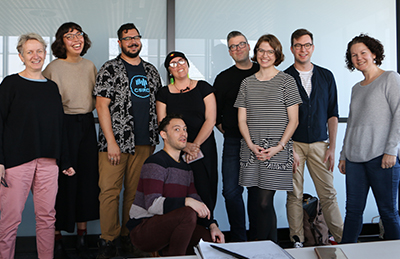NIDA’s Master of Fine Arts (Cultural Leadership) has been designed specifically for mid-career producers, directors and managers in the cultural sector. With online blended learning and on campus intensives, students study while working, take time out for reflecting and thinking, and gain access to industry experts and prominent guest speakers.

Photo: Lecturer Angharad Wynne-Jones (left), with guest lecturers Georgia Mokak and Alison Murphy-Oates and NIDA Master of Fine Arts (Cultural Leadership) students.
NIDA’s Master of Fine Arts (Cultural Leadership) has been designed specifically for mid-career producers, directors and managers working full-time in the cultural sector. With online blended learning and on campus intensives, students study while they’re working, take time out for reflecting, learning and thinking, gain access to international and national industry experts and prominent guest speakers.
In August both the first and second year cohorts experienced the intensives. Sam Moynihan, theatre and education performer and independent theatremaker from Canberra, is graduating next year. He’s interested in using theatre to facilitate foster dialogue and create social change.
Sam’s international placement is the culmination of the MFA in Cultural Leadership, as he explained: ‘I am travelling to Palestine to work with a theatre company there with primary school students and teenagers, using a similar technique to my professional education work. Palestine is the nexus of my practice as that is a society that needs social change and dialogue and theater helps people establish a sense of identity and overcome trauma.’
Reflecting on the MFA program, Sam said that there is both broad scope and detail in the course. It covers all aspects of leadership in an arts organisational context, for example the module about the intricacies of a board environment.
‘In the cultural sector we’re all struggling to maintain a balance between being changemakers and allowing change to make us. The on-campus intensives give us the chance to have fearless debates about arts topics and insights while at the same time giving you the exposure to industry teachers, guest speakers and other students in the sector.’
Robyn Archer, Chair of the MFA Cultural Leadership remarked: ‘We all know that gifted cultural leaders can arise naturally from all arts genres, and while they will have training and/or great experience in their own art form, one of their most essential qualities will be the ability to speak about and advocate for the whole of the arts landscape; this may have evolved naturally without the need for specific training.’
Brisbane-based Ben Hughes, lighting designer for live performance said: ‘The MFA Cultural Leadership is broadening my mind. It’s easy to be isolated inside a company so the opportunity to look at the broader issues is really valuable.’
Helen Healey is an arts and cultural engagement consultant working in regional Victoria and in Mungo National Park with traditional owners. ‘The MFA Cultural Leadership has had a huge impact on my career personally and professionally,’ she said. ‘Everything I have done so far in my career has been done by me innately. I know that in this course I am scaffolding that academically. I can see that studying elements of leadership is already having an immediate impact on the consultancy work I am doing.’
Robyn Archer added: ‘The graduates from this unique Master of Fine Arts course have a remarkable grasp of the nuts and bolts of what makes the arts run, a solid understanding of the recent history of the arts in Australia, and a lively intelligent comprehension of recent and current issues. I can’t recommend this MFA too highly.’
